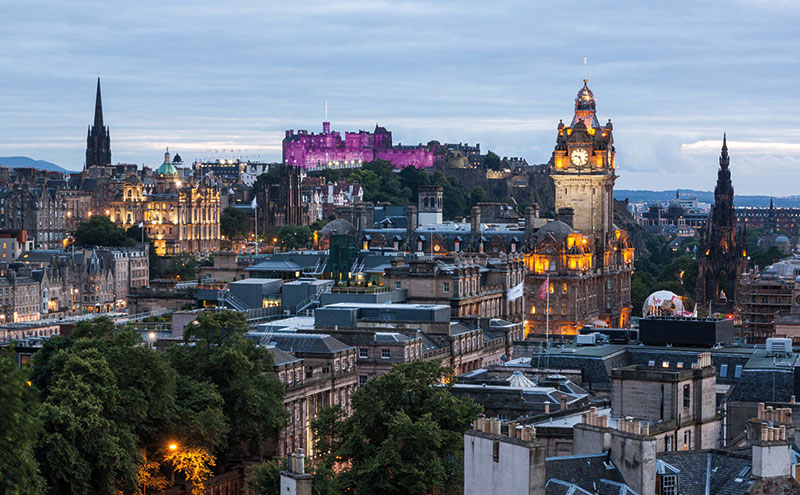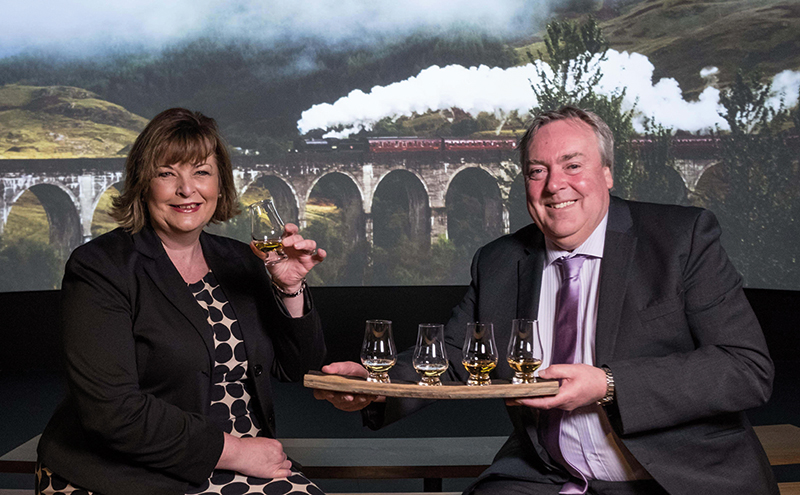
Fiona Hyslop, tourism secretary at the Scottish Government, recently sat down with SLTN’s Dave Hunter to discuss the licensed trade and wider hospitality industry in Scotland. (The meeting took place before the Conservative party conference.)
SLTN: How important are pubs to Scotland’s tourism industry?
Fiona Hyslop: “Pubs and bars and restaurants are very important to tourism. If you think about it, £1 in every £5 spent on tourism is spent on food and drink, so we want the experience of that to be authentic, but also good quality.
“We’ve seen a real change in Scotland in recent years in terms of the offer – we’ve got programmes like Taste the Best – and there’s a real drive to have quality food and drink, and Scottish-produced food and drink, supplied.
“One of the things that’s very important from a tourism point of view, and from an industry point of view, is that we know customers are prepared to spend up to 15% more for food and drink that’s produced locally.
“Another aspect is that spirit of Scotland, which is so important. We’ve got a real drive just now to capture the Scottish spirit, in terms of our tourism offer – to get people to tell stories of the authentic Scotland, and lots of different hotels, bed and breakfasts, visitor attractions, and also pubs and restaurants are seeing the benefit of that referral by their customers of what is authentic about this pub or that restaurant, because it captures the Scottish spirit.
“The quality of what we have – we’ve got the most amazing larder in terms of our lamb, our meats, our cheeses, our vegetables, our fruit.
“And in our drinks industry, we’ve always had fantastic whiskies and real strong growth in beers, but we’re also seeing growth in the gin market, where we’re seeing a whole new sector developing on the back of very successful Scottish gin products. We’re widening and deepening the experience for visitors when it comes to food and drink, and really capturing people’s imagination.”
Recent surveys by the SLTA and others have reported that the lower drink drive limit has had a significant impact on trade in premises across Scotland. Did the Scottish Government underestimate the impact the lower limit would have on the licensed trade?
“I think we identified the problem in terms of health and safety, and that has to be a priority in terms of public policy.
“I’m also aware that, because of a growing understanding of the need to encourage people not to drink and drive, there’s been far more focus on food.
“It comes back to the point about an awful lot of places are diversifying, having food as a staple and that actually becoming more of an aspect of the profit line as well.
“It’s also a point of what’s acceptable or not acceptable, and I think the wider public are very supportive of having stronger drink drive provisions. So we stand firm and say that was the right thing to do.”
Has there been polling among the public to gauge the popularity of the new drink drive limit?
“An awful lot of work takes place before legislation. A lot of consultation and research takes place before you carry out your legislation.
“What we want to do is continue to assess the strength of the food and drink market, and the food and drink market is very strong. Half of UK exports are in the food and drink sector. What we’re trying to do is obviously make sure that provision and that success is also realised within pubs and restaurants domestically – to make sure that Scotland isn’t just renowned for exporting great food and drink, we’re actually renowned for the consumption of great food and drink within our pubs and restaurants.
“It’s about a shift in emphasis. Obviously Scotland is becoming more family-friendly, and I think that’s important. So therefore, if you’ve got a situation where you’ve got more families visiting pubs and restaurants, I don’t think anybody wants to be at risk going either to or from a pub or restaurant by somebody who is clearly impaired by how much they have drunk.”
In a recent SLTA survey the majority of respondents cited further government legislation as their biggest concern. Are there any plans for further legislation that would impact on the trade?
“I’m not aware of any current plans. There wasn’t anything in our programme for government, or in our manifesto, that would lead to further changes, that I’m aware of.
“But my responsibility’s tourism. I’m not responsible for planning or licensing.
“There’s also a business rates review, but that might result in a positive view. We don’t know what the consultation will show. We’ve always got to keep an eye on those aspects.”
How committed is the Scottish Government to looking at the rates system?
“I’ve encouraged pubs and restaurants in my area, if they have any concerns, to take part in the consultation because it’s exactly the point of ‘what is fit for purpose in today’s market?’
“Obviously times have changed: the market’s changed, the experience has changed, the turnovers are different, the makeup relative of food to drink, that ratio has changed. So the review will be looking at different aspects of business rates, but I think there’s a place for the licensed trade to make sure its voice is heard as part of that. “Obviously the first stage was making sure they contributed to the consultation.”
Do you have any concerns over the Hogmanay Old Firm clash and the impact any incidents could have on tourists’ impression of Scotland?
“The first thing is to make sure there’s no trouble at any Old Firm game. Clearly the timing and scheduling is for the SPFL and also for the police, and the police are very conscious of the need to make sure safety and public order is paramount.
“In terms of looking at how we view our winter festivals all over Scotland, we at the Scottish Government have promoted winter festivals. We also want to make sure they are family friendly, they are inclusive, and that people stay longer in our city centres.
“You’ve seen the growth in Edinburgh from what was one night – Hogmanay – has now become a week of celebrations. Much has been done to try and encourage people to come in to spend money, not just in pubs and restaurants, but in shops. It’s a great opportunity to bring people into the city centre. These are all aspects that should be borne in mind by anybody scheduling timing.
“But the clear responsibilities for this don’t lie with the tourism agency or with the Scottish Government. But it’s something I’m sure the city of Glasgow itself would have a view on that they would be able to express directly to the relevant authorities.”
You have spoken out recently against the introduction of any tourist taxes in Scottish cities. Why is that?
“The Scottish Government’s position has been against a tourist tax, because the tourism industry is already the second highest-taxed of any tourism industry in the whole of Europe. That’s because other countries where cities have tourism taxes have much lower VAT levels than we have.
“In terms of facing up to the future after the UK’s Brexit vote, some people are saying it might give us more flexibility on VAT, but actually the UK Government currently has flexibility on VAT and could reduce it. If VAT was reduced on tourism it would allow a bit more opportunity to think about how things might be done more creatively in different areas.
“But I believe it’s really important we invest in our cultural offer. As culture secretary I’m very conscious that people come to experience our culture. You can’t neglect it. You’ve got to continue to invest.
“Currently we’re in a position where tourism is taxed far more than many other industries and very highly taxed in a competitive environment across Europe.
“You talked earlier about what the biggest threats are that people are facing. Given that restaurants, we understand, around 30% are staffed by EU nationals, I would have thought one of the serious considerations pubs and restaurants are making is their staffing requirements.
“It’s essential the UK Government gives a sense of security and comes out clearly that these EU nationals are welcome and should stay here.
“The Scottish Government made quite clear that these EU nationals should stay and are welcome, and we think that’s very important from a very personal level. These are people with family and friends and just from a basic sense of humanity we need to give them a sense of certainty.
“But from a hard economic view there’s a strong interest for the pub trade and for restaurants to make sure we can retain the EU nationals we have, and have freedom of movement in the future. So I understand it’s 30% for restaurants. We understand from the tourism sector as a whole, 17% of the workforce in the tourism industry are EU nationals. I was up visiting Deanston Distillery and obviously it’s a great tourism attraction as well as producing some of our finest whisky. It’s a challenge for many of the people involved in tourism there. These are very hard, very immediate issues that have to be faced.
“So rather than any hypotheticals of any legislation that may or may not come – and we’re not planning any immediate legislation in this area – we’re facing a very immediate decision, post-Brexit, as to what happens to EU nationals.
“On day one after the EU Referendum vote the first minister made it clear that EU nationals living and working here are very welcome and we value the contribution we make to our economy and our society.
“I’ve had a number of meetings with UK ministers and at every meeting I’ve had with a UK minister I’ve raised this issue, because it is of that importance to me and to the government.”
On a lighter note, what is your favourite pub in Scotland?
“I don’t get out much. I’m working so hard I very rarely get the opportunity to go to a pub. But one of my favourite pubs is the Star & Garter in my hometown of Linlithgow, which was amazingly restored after it burned down.
“It’s a very old building. It’s the oldest building between Edinburgh Castle and Stirling Castle. It was restored and it’s always been a place of meeting people in Linlithgow. You can have meals there, you can have a drink there, there’s a function room so you can have functions there. That’s, I suppose, my favourite.”
And favourite alcoholic drink?
“I’m working my way, slowly, through the very interesting range of gins that Scotland is producing. I’ve had Caorunn, which is very nice, and I really like Rock Rose as well.
“But I think it’s really interesting that when I’ve been promoting food and drink internationally – I was in Paris around this time last year – we had a whisky stall and a gin stall, and the gin stall was as busy as the whisky stall.
“Last July I was in Nagasaki and we met with (people from) the licensed trade there. We took over Scottish craft beers and whiskies to promote Scottish drink to them. And we had chefs using Scottish produce and they were very impressed by what we had and what we were producing.
“The reputation of our food and drink is being spread internationally, which means people are coming over, looking for opportunities.
“A third of visitors say they would consider booking accommodation simply because of the reputation for outstanding food. So that’s a value to people when they’re considering where they might book, where they might stay.
“I’m not sure we could have said that 15/20 years ago, which shows you how the industries have come together – the licensed trade, the tourism industry – in promoting. And you now see locally-produced food advertised all over the place and it’s the right thing to do for the Scottish economy, but it also has a bottom line in terms of profitability for the pubs and restaurants that use it.”
How important do you think it is that the tourism industry continues to invest in training and raising standards?
“As tourism secretary it’s so important that at half past one this afternoon I had a meeting with the chair and the chief executive of Skills Development Scotland precisely to discuss tourism and what they’re doing to help support the sector and what we’ll be doing in the future.
“This morning I was at the Apex Hotel where we launched the Skills Investment Plan. I met a number of apprentices that are working their way through spending time in different parts of the hotel trade as part of their apprenticeships.
“Also today, the Scottish Tourism Alliance has a great strategy – the Scottish Tourism Strategy 2020. Today it launched a website, which is called the Big Five Questions, and the idea is to help the industry to help itself in terms of five things – if they can answer yes to them they’re helping the business to grow, if they can answer no to any of them it means they’ve got to work on it.
“There’s a lot happening in the skills side of things, promoting tourism as a great career choice for people. It’s certainly a sustainable career choice, it’s a growing area, it’s in every part of Scotland, and part of my role as tourism secretary is to help promote it as a career choice, because you can see how people develop and get on. Because there’s nothing more satisfying than running your own business based on the fantastic product of food and drink, attracting tourism, whether it’s local or international.”























